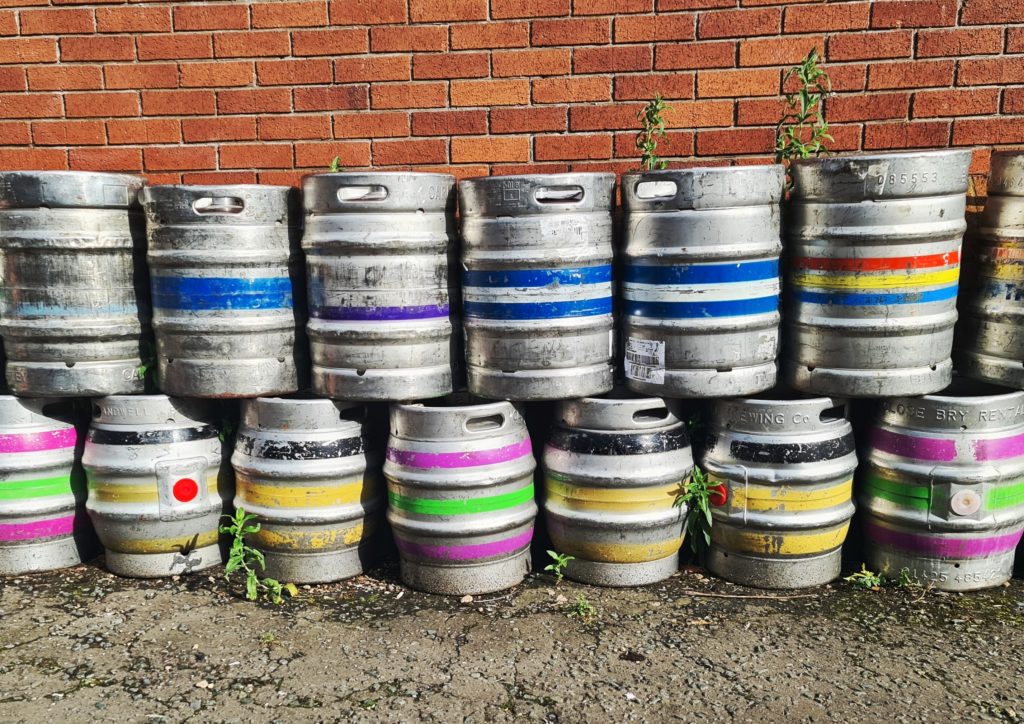Kegs, Tap Markers, and Pallets: Handling the Property That Isn’t Beer

When it comes to delivering beer from breweries to distributors and from distributors to retailers, it’s not just about the beer. There are also kegs, tap markers, and pallets that change hands in each transaction, and the Florida Beverage Law does not provide much guidance on their management. This is why it’s important for all parties – brewery, distributor, and retailer – to work out among themselves how to handle kegs, tap markers, and pallets.
Kegs
Breweries invest a lot in their kegs, whether they are traditional reusable kegs or newer single-use kegs. Whether a brewery buys their kegs or uses a keg leasing service, they are at risk of losing their investment if the kegs go missing. Breweries should have clear plans for managing their keg inventory and should ensure that their distributors are following these plans. According to industry practices, breweries should charge distributors a keg deposit for each keg delivered, in an amount that reflects the cost to replace the keg if it goes missing.
The Florida Beverage Law does not address the handling of kegs between breweries and distributors, but Florida Statutes Section 561.4205 covers the handling of kegs between distributors and vendors. Distributors are required to charge vendors a keg deposit in an amount not less than the keg deposit charged by the brewery. The deposit must be uniform for like brands and should be shown on a sales ticket or invoice given to the vendor. When the vendor returns the keg and the distributor credits the keg deposit back, this must also be shown on a sales ticket or invoice.
Some Florida distributors are allowed to implement an alternative inventory and reconciliation process for certain Florida vendors. Entertainment/resort complexes and marine exhibition park complexes are the only vendors eligible to participate in this process. The process must occur at least once a year, and the vendor is required to pay the distributor for any missing kegs.
Tap Markers
Breweries often provide tap markers (or branded tap handles) to their distributors. Vendors are required to attach the name of the beer being served to each tap marker in plain view of the public. See Florida Statutes Section 563.03. Breweries often design unique, branded tap markers to help market their beers, and when they provide a tap marker to the distributor, and the distributor provides it to the vendor, what happens to the tap marker when it is no longer needed?
According to the Florida Beverage Law, distributors are allowed (but not required) to deliver tap markers to vendors for free (along with other draft equipment of nominal intrinsic value). See Florida Statutes Section 561.42(14)(f). Alternatively, distributors can charge a tap marker deposit, just like a keg deposit, but this must be clearly understood by all parties.
The best practice is for the brewery and distributor to first decide if the brewery will charge a tap marker deposit to the distributor. If the distributor is charged a deposit, they will likely pass the cost on to the vendor.
Without a tap marker deposit or agreement between the brewery and distributor, the brewery should presume that the tap markers will not be returned to them. Distributors usually do not take steps to retrieve tap markers that they have given to vendors. If retrieving the tap markers is important to a brewery, the distribution agreement should make the distributor responsible to return the tap markers or pay the supplier for the replacement of the markers.
Pallets
Beer that comes in cans or bottles is usually delivered by breweries to distributors, and by distributors to vendors, on wooden pallets or similar containers. These pallets help stack the beer and make it easy to move with a forklift. But, the law in Florida doesn’t say who owns the pallets or who is responsible for returning them to the brewery.
The brewery has to buy the pallets and replace them if they don’t get returned. Sometimes distributors will return the pallets on their own, but they don’t have to unless a contract says so.
Breweries can ask for a deposit for the pallets, just like they do for kegs or tap markers. This should be written in the contract with the distributor. Without a contract, the brewery shouldn’t count on getting the pallets back.
Most vendors that sell the beer don’t have a contract to return the pallets to the distributor. Only big stores that buy a lot of beer might have a contract that requires them to return the pallets or pay a deposit.
Do you have questions about managing kegs, tap markers, and pallets? Contact us to schedule a consultation with a beverage attorney.
Because we’re attorneys: Disclaimer. Posted February 12, 2023.

